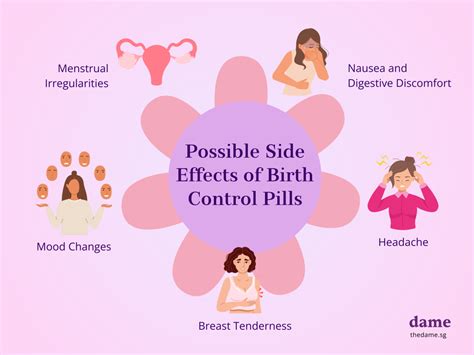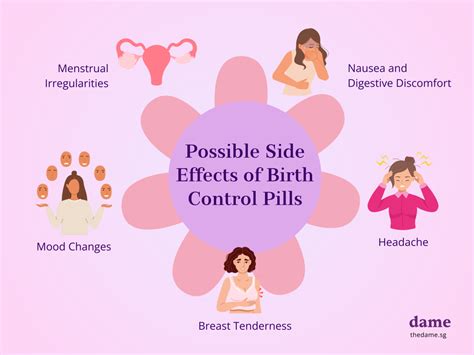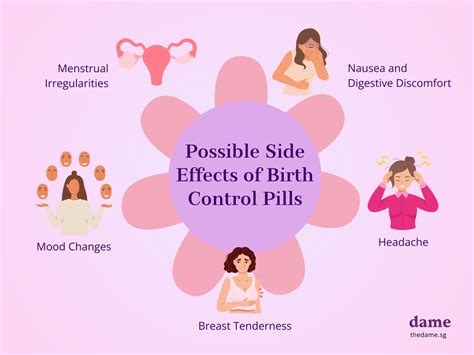Intro
Discover common birth control pills side effects, including hormonal changes, weight gain, and mood swings, to make informed decisions about contraceptive methods and womens health options.
The use of birth control pills has become a common practice among women of reproductive age, with millions of women worldwide relying on them as a convenient and effective means of preventing pregnancy. However, like any other medication, birth control pills can have side effects, some of which can be mild and temporary, while others can be more severe and long-lasting. It is essential for women to be aware of the potential side effects of birth control pills to make informed decisions about their reproductive health.
The importance of understanding the side effects of birth control pills cannot be overstated. While these medications have revolutionized the way women manage their fertility, they can also have a significant impact on overall health and well-being. From mild symptoms like nausea and headaches to more severe conditions like blood clots and stroke, the potential side effects of birth control pills are numerous and varied. By educating themselves about these risks, women can take steps to minimize their exposure and ensure that they are using their birth control pills safely and effectively.
The complexity of birth control pills side effects is also influenced by individual factors, such as age, medical history, and lifestyle. For example, women who are over 35 years old and smoke may be at a higher risk of experiencing severe side effects, such as heart attack and stroke. Similarly, women with a history of certain medical conditions, like high blood pressure and migraines, may need to exercise extra caution when using birth control pills. By understanding these individual factors and how they interact with the potential side effects of birth control pills, women can make informed decisions about their reproductive health and take steps to protect themselves from harm.
Common Side Effects of Birth Control Pills

The most common side effects of birth control pills include nausea, headaches, breast tenderness, and mood changes. These symptoms are usually mild and temporary, resolving on their own within a few months of starting the medication. However, some women may experience more severe side effects, such as weight gain, acne, and changes in libido. In rare cases, birth control pills can also cause more serious side effects, such as blood clots, stroke, and heart attack.
Types of Birth Control Pills and Their Side Effects
There are several types of birth control pills available, each with its own unique set of side effects. Combination pills, which contain both estrogen and progesterone, are the most common type of birth control pill and can cause a range of side effects, including nausea, headaches, and breast tenderness. Progestin-only pills, on the other hand, can cause side effects like weight gain, acne, and changes in menstrual bleeding. It is essential for women to discuss their individual needs and medical history with their healthcare provider to determine which type of birth control pill is best for them.Severe Side Effects of Birth Control Pills

While rare, severe side effects of birth control pills can be life-threatening. Blood clots, stroke, and heart attack are among the most serious side effects of birth control pills, and can occur in women who are over 35 years old, smoke, or have a history of certain medical conditions. Other severe side effects of birth control pills include liver tumors, gallstones, and high blood pressure. Women who experience any of these symptoms should seek medical attention immediately.
Risk Factors for Severe Side Effects
Certain risk factors can increase a woman's chances of experiencing severe side effects from birth control pills. These include age, smoking, and a history of certain medical conditions, such as high blood pressure, migraines, and deep vein thrombosis. Women who are overweight or obese may also be at a higher risk of experiencing severe side effects, as excess weight can increase the risk of blood clots and other cardiovascular problems.Minimizing the Risk of Side Effects

While it is not possible to eliminate the risk of side effects from birth control pills entirely, there are steps that women can take to minimize their risk. These include choosing a low-dose pill, avoiding smoking, and maintaining a healthy weight. Women should also discuss their individual needs and medical history with their healthcare provider to determine which type of birth control pill is best for them.
Lifestyle Changes to Reduce Side Effects
Making lifestyle changes can also help to reduce the risk of side effects from birth control pills. These include eating a healthy diet, engaging in regular exercise, and managing stress. Women should also avoid smoking and limit their intake of alcohol and caffeine, as these substances can increase the risk of side effects.Alternatives to Birth Control Pills

For women who experience severe side effects from birth control pills or who are looking for alternative methods of contraception, there are several options available. These include intrauterine devices (IUDs), implants, and condoms. Women should discuss their individual needs and preferences with their healthcare provider to determine which method of contraception is best for them.
Non-Hormonal Methods of Contraception
Non-hormonal methods of contraception, such as copper IUDs and condoms, can be a good option for women who are looking to avoid the side effects of hormonal birth control. These methods are highly effective and can be used by women of all ages. However, they may require more maintenance and planning than hormonal methods, and may not be as convenient for women who are looking for a low-maintenance method of contraception.Conclusion and Next Steps

In conclusion, while birth control pills can be an effective and convenient method of contraception, they can also have side effects, some of which can be severe. By understanding the potential side effects of birth control pills and taking steps to minimize their risk, women can make informed decisions about their reproductive health and take control of their fertility. If you are experiencing side effects from birth control pills or are looking for alternative methods of contraception, it is essential to discuss your individual needs and preferences with your healthcare provider.
We invite you to share your thoughts and experiences with birth control pills in the comments section below. Have you experienced side effects from birth control pills? What methods of contraception have you found to be most effective for you? By sharing your story, you can help to educate and empower other women to take control of their reproductive health.
What are the most common side effects of birth control pills?
+The most common side effects of birth control pills include nausea, headaches, breast tenderness, and mood changes. These symptoms are usually mild and temporary, resolving on their own within a few months of starting the medication.
Can birth control pills increase the risk of blood clots and stroke?
+Yes, birth control pills can increase the risk of blood clots and stroke, particularly in women who are over 35 years old, smoke, or have a history of certain medical conditions. Women who experience any symptoms of blood clots or stroke, such as chest pain, shortness of breath, or weakness in the face or arm, should seek medical attention immediately.
What are the alternatives to birth control pills?
+Alternatives to birth control pills include intrauterine devices (IUDs), implants, and condoms. Women should discuss their individual needs and preferences with their healthcare provider to determine which method of contraception is best for them.
